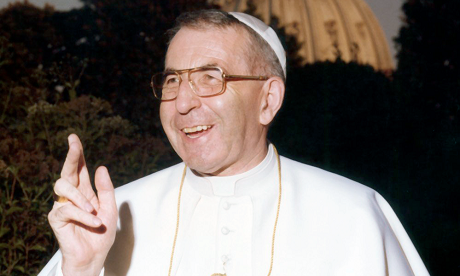Pope John Paul I seems to have favoured artificial contraception in some cases, a document he drafted in 1967 suggests.
The man who would become pope – then Bishop Albino Luciani – prepared the document on contraception on behalf of the bishops of Italy’s Triveneto region. It was then was given to St Paul VI before he issued his encyclical, Humanae Vitae.
The encyclical upheld the Church’s opposition to artificial birth control.
John Paul I’s document was not available publicly until 2020.
His initial openness to softening Catholic teaching on contraception and his later support for Paul VI has come to notice on the eve of the World Meeting of Families. His beatification in September is also in sight.
Andrea Tornielli of Vatican News says there is also “a very rare audio tape” of Luciani talking about Church teaching on regulating births.
His comments were made during a conference in 1968 – before Humanae Vitae was released.
“For me this is the biggest theological issue that has ever been dealt with in the Church.
Tornielli quotes Luciani as hoping for a “liberalising” word from Paul VI, saying:
“When there was Arius or Nestorius and they were talking about the two natures in Christ, they were serious issues, yes, but they were understood only at the top of the Church, by theologians and bishops.
“The poor people understood nothing about these things and would say, ‘I adore Jesus Christ, I love the Lord who redeemed me,’ and it was all there, there was no danger.”
The future Pope John Paul I then said the issue of whether it is permissible under some circumstances to use some forms of birth control, “is a problem that no longer concerns the top leadership of the Church, but the whole Church, all young families.”
Vice postulator of John Paul’s sainthood cause, Stefania Falasca, says Luciani was interested in “the moral and scientific problems related to birth control”.
He studied them “seeking a way in which the application of Catholic doctrine could also take into account the drama of conscience of many believing couples, tormented by the discord between fidelity to magisterial indications and the actual difficulties of life as a couple.”
Falasca says by urging a somewhat more liberal position before Humanae Vitae and urging full acceptance of the teaching afterward, Luciani was being Catholic.
“One must distinguish, on the one hand, the reflection and concerns in research by a pastor who is also a dogmatic theologian, close with great pastoral sensitivity to the difficulties of so many Christian couples and therefore in favour of a deepening of Catholic doctrine on the issue and, on the other hand, consider the bishop faithful to a doctrine that had remained substantially and consistently steadfast in its disapproval of contraceptive practices.”
It’s also important to “consider the bishop faithful to a doctrine that had remained substantially and consistently steadfast in its disapproval of contraceptive practices,” she says.
He also urged pastors to be gentle with penitents, encouraging them to grow in accepting the teaching of Humanae Vitae without condemning them if they could not fully comply.
Source
Additional readingNews category: Great reads, World.




